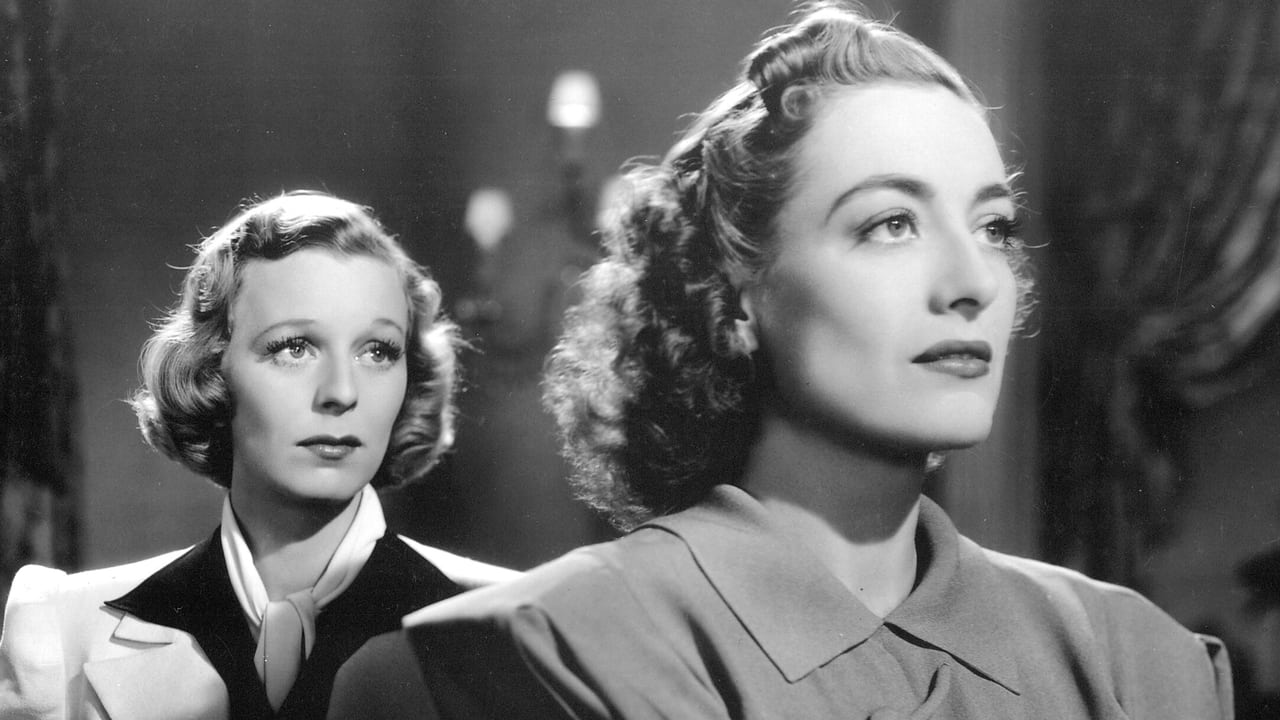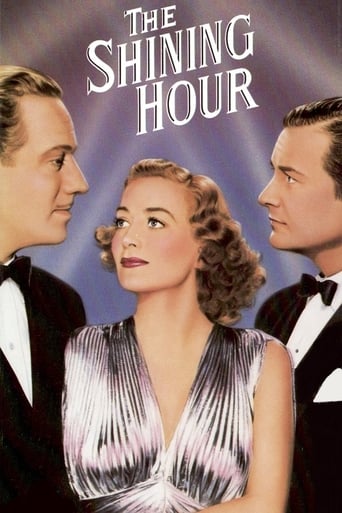Titreenp
SERIOUSLY. This is what the crap Hollywood still puts out?
Nonureva
Really Surprised!
Comwayon
A Disappointing Continuation
Billy Ollie
Through painfully honest and emotional moments, the movie becomes irresistibly relatable
Michael_Elliott
The Shining Hour (1938) ** (out of 4) Rather bizarre melodrama from MGM and director Frank Borzage about a showgirl (Joan Crawford) who marries a man (Melvyn Douglas) but it's objected by his rather sinister sister (Fay Bainter). The brother (Robert Young) and his wife (Margaret Sullavan) warm up to the new woman even when it appears that Young is falling in love with her. THE SHINING HOUR probably would have been a great movie had two things happened. One would be if the film was made during the pre-code era so that some of the weird love angles could have been better developed. The second way is if this was made in the 1970's and could have gotten a R-rating and shown the rather weird obsession that the sister has with her brother. This "relationship" is quite creepy at times and I'm sure an exploitation picture could have had a party with it. As is, the film is just way too silly and boring to really work. The entire time I was watching the film I couldn't help but think that these were some of the most annoying characters I've seen in a movie from this period. None of their actions really make any sense and especially the crazy sister who wants Crawford out of the house. I'm not going to ruin what the sister eventually does but you'll be wanting to walk away from your televisions. I'm also not going to ruin the ending but it has to be one of the dumbest ones in the history of cinema. No, I'm not being over-dramatic. It really is a horrible ending. It's really too bad the film didn't work better and especially when you consider the talent in front of and behind the camera. Borzage keeps the film moving at a decent pace but there's just nothing to the story. Both Crawford and Douglas are good in their roles and there's no doubt that Sullavan and Young add nice support. Both Bainter and Hattie McDaniel are also good. Still, this film is just going to appeal to those who must see everything these stars did in their careers.
dbdumonteil
A minor work by highly talented Frank Borzage is always worth watching .Coming after "Three comrades" it cannot hold a candle to it.But Margaret Sullavan is featured again as Judy and it's finally her character who sums up Borzage's philosophy in "the shining hour" : a woman whose love is so true and so pure she will do anything to make her husband happy ,even if she's got to give everything she's got even her own life.The screenplay often recalls "Waterloo Bridge" (the first version was made in the early thirties ,the Leigh/Le Roy version was released later in 1939): a plebeian (Crawford) is an intruder in a posh aristocratic milieu.But she is a dancer ,not a prostitute !The only person who wants to get rid of her is old sister Hannah ,still a spinster,but the true reason is not that she's not in the same league (the tea scene is revealing) but that she stole her brother from her.Hannah is an over possessive sister ,in love with Henry ,Fay Bainter's performance leaves no doubt about it.There's a similar relationship in Hitchcock highly underrated "Marnie " (1964) between Sean Connery and Diane Baker.
theowinthrop
It's soap opera, but it is good soap opera, with several good performances in it.Joan Crawford is a Broadway dancing star, helped on her way up by Allan Joslyn. Joslyn would like it to be the start of a marriage, but his cynical frame of mind is not what Crawford can accept (outside of friendship). She meets wealthy Wisconsin gentleman farmer Melvin Douglas, and he gets her to agree to marry him (Joslyn is uncertain about the wisdom of the move, not only from self-interest but from concern that Crawford will be a fish out of water). Another party who is troubled by the marriage is Douglas's brother Robert Young, who thinks Crawford will be too like her friends. Despite this Young and Douglas marry, and soon are in Wisconsin. They bring with them Hattie MacDaniel, Crawford's smart maid.(A small point about the film - MacDaniel had not gotten her Oscar yet for GONE WITH THE WIND but there are moments when the camera is concentrating on her, and when she is involved in scenes, where any other African-American actress of the period (say Louise Beavers) playing a maid would not have gotten camera time - I wonder if this was because Hattie was photogenic and the movie crews were noticing this, or because David Selznick may have noticed her and requested some additional footage for her. She handles the role with customary humor and spice.) Crawford finds (although she has had hints) that Douglas' older sister (Fay Bainter) is cold and hostile. More about this later. Young's wife (Margaret Sullivan) is very friendly and sweet. But although Crawford warms up to Sullivan, Young (who had been initially cold to the marriage) begins showing a different attitude: he is falling in love with Crawford. Bainter takes an "I told you so!" attitude to this, and Sullivan becomes increasingly miserable. Only Douglas seems oblivious - in particular because Crawford is making every effort to remain faithful.The climax concerns the dream house that Douglas and Crawford were planning to build a few miles from Bainter's home. Instead of being a solution to the twisted mess, it becomes a magnet for the coming disaster. It is only with the disaster that the relations are sorted out.Now about Bainter: This film was made within three years of the renewal (and new teeth) to the Hollywood Production Code. As such, certain things could be said and certain things couldn't. In terms of the code, the film fits properly. But with Bainter, they managed (or that fine actress did) to push the envelope a little. In a confrontation scene with Douglas, Bainter reveals something about her private feelings. She hates Crawford, and tells Douglas to get rid of her, eventually saying, "I'm your sister and I love you!" Her character is a repressed spinster type (she is the oldest of the siblings), and she has never really been close to Sullivan (although the latter grew up in the area). One gets the impression Bainter has certain incestuous feelings for Douglas and even Young (and that the former chooses to overlook these, and the latter resents them). This seems to be the first time this kind of situation arises in a film prior to Geraldine Fitzgerald's performance as George Sanders' possessive sister in THE STRANGE AFFAIR OF UNCLE HARRY, but that at time was slightly more explicit.With Frank Albertson in a supporting part as a rustic with jazz trumpet ambitions (who momentarily makes the situation for Crawford get a bit murkier).
Pat-54
Beyond soap opera. This movie is pure camp. Unintentionally hilarious at times. It's movies like this that caused theatre owners in 1938 to declare Joan Crawford "box-office poison."

